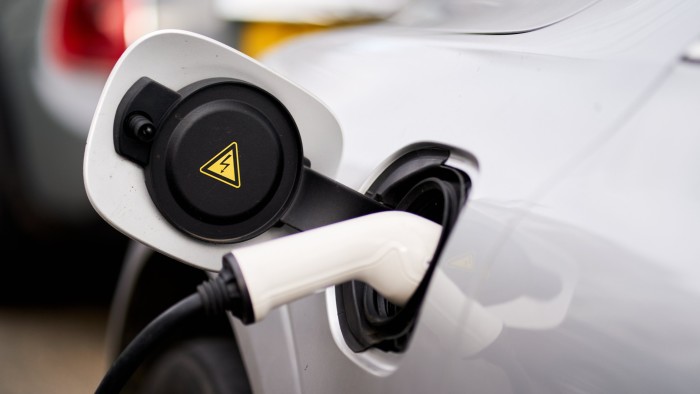Stay informed with free updates
Simply sign up to the Electric vehicles myFT Digest — delivered directly to your inbox.
Leading operators and investors in UK charging networks for electric vehicles have warned that changes to government targets for getting battery-run cars on the road would be “disastrous” for the industry.
Their concern came after the government announced it would consult on changes within its “electric vehicle mandate” of ensuring all new cars sold by 2035 are zero-emission
This followed complaints from carmakers that demand in the market was stalling and the punishments for not reaching sales goals were excessive.
But Ian Johnston, CEO of Osprey Charging, one of the largest networks, said: “It cannot be underestimated how much damage has been done by statements around moving dates back. This risks showing the UK as uninvestable by global funds at a time where we need this more than ever before.”
Adam Gillett, senior investment manager at Railpen, a UK pension fund with £34bn under management and a sector investor, said: “Keeping the [mandate] as it is would stimulate investment; any uncertainty would throw disorder into that transition.”
Under the government’s targets a certain percentage of each carmakers’ annual sales need to be zero-emission vehicles, with the percentage annually rising from 22 per cent this year to 80 per cent in 2030. Companies face fines of £15,000 for each missed vehicle.
Electric vehicles accounted for 18 per cent of the market between January and November this year — well below the 22 per cent threshold set by the mandate.
The EV charging industry has invested heavily in the UK, with almost 73,000 public charging points across the country as of November 2024, according to charging map provider Zap Map. It has based its business models on existing government targets.
A report from the National Audit Office released on Friday concluded that although challenges such as regional disparities in charging infrastructure remained, the industry was on track to meet the Department for Transport target of 300,000 EV public charging points in the UK by 2030.
Those building the network are wary of potential changes to the mandate, which could include extending or expanding existing flexibilities that allow carmakers to buy credits from rivals to avoid fines. Carmakers are also calling for flexibility on fines.
Members of industry lobby group Charge UK have pledged up to £6bn in investment in installing and operating EV infrastructure by 2030, however, future spending could be at risk if the mandate were to be significantly changed.
Charge UK CEO Vicky Read said the mandate was the “rock” on which investor confidence was built, and a shift in policy would be an “unmitigated disaster for investor confidence”.
Adrian Fielden-Gray, Be.Ev chief operating officer, said that movement on the mandate now “would give the impression further changes could be on the way — scaring investors”. The CEOs of Octopus EV and Pod Point also urged the government to hold firm on the targets.
The UK Sustainable Investment and Finance Association, which represents over 300 investors, published a report earlier this year which found that 57% of large transport businesses had moved or planned to move investments out of the UK to a market they saw as more supportive of their sustainability goals.
James Alexander, UKSIF chief, said investors needed to believe the government would “stick to their guns when the politics gets difficult”. “After years of political instability, the UK risks losing investment to the US and Europe should uncertainty continue,” he added.
A government spokesperson said its commitment to phasing out combustion engine cars by 2030 had not changed. “This provides the vehicle manufacturing and charging industries with the certainty they need to invest in the transition, driving growth as we accelerate towards net zero.”
Read the full article here

